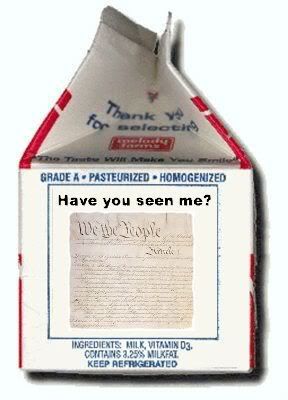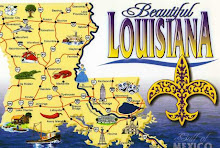Saturday, October 24, 2009
SO TRUE !
Got this in an email the other day; thought it was pretty much to the point:
Conservative/Liberal
If a conservative doesn't like guns, he doesn’t buy one. If a liberal doesn't like guns, then he thinks no one should have one.
If a conservative is a vegetarian, he doesn't eat meat. If a liberal is a vegetarian, he wants to ban all meat products for everyone.
If a conservative sees a foreign threat, he thinks about how to defeat his enemy. A liberal wonders how to surrender gracefully and still look good.
If a conservative is homosexual, he quietly enjoys his life. If a liberal is homosexual, he loudly demands legislated respect.
If a black man or Hispanic is conservative, he sees himself as independently successful. His liberal counterparts see themselves as victims in need of government protection.
If a conservative is down-and-out, he thinks about how to better his situation. A liberal wonders who is going to take care of him.
If a conservative doesn't like a talk show host, he switches channels. A liberal demands that those he doesn’t like be shut down.
If a conservative decides he needs health care, he goes about shopping for it, or may choose a job that provides it. A liberal demands that his neighbors pay for his.
If a conservative is a non-believer, he doesn't go to church. A liberal non-believer wants any mention of God and religion silenced. (Unless it's a foreign religion, of course!)
If a conservative slips and falls in a store, he gets up, laughs and is embarrassed. If a liberal slips and falls, he grabs his neck, moans like he's in labor and then sues.
If a conservative reads this, he will forward it so his friends can have a good laugh. A liberal will delete it because he is "offended".
Saturday, September 26, 2009
"ONE NATION UNDER GOD"
Wednesday, September 16, 2009
Monday, September 14, 2009
Saturday, August 22, 2009
Multi purpose functions
VERY INTERESTING
Laura Rose
(From DivineCaroline.com) - When I heard about the "Plastic Continent" in the middle of the Pacific Ocean, I have to admit that I thought it was just an urban myth or an overreaction by some extreme activists.
Much to my dismay, what I found by searching the Internet was that it was more of an understatement than an exaggeration. There it was "3.5 million tons of trash, 80 percent of it plastic" a mass twice the size of Texas. Yes, TEXAS!
At a cost of billions of dollars to clean up the mess, no country wants to take responsibility for it, and so it has continued to grow at a rate of tenfold per decade since 1950.
Sea turtles mistake plastic sandwich bags for jellyfish, and birds feed their young bottle caps and other plastic chards, unknowingly filling their stomachs to the point that they die of starvation. Beaches once scattered with drift wood and seashells are increasingly covered in plastic debris.
If you live in San Francisco, you now know why the Board of Supervisors, led by Ross Mirkarimi, outlawed the use of plastic bags in grocery stores and other retail outlets. Every city needs to follow their example and make this a priority.
Right now, there doesn't seem to be much that we can do about the garbage dump that churns between San Francisco and Hawaii, but we can do our part to keep it from growing.
1) Tell everyone you know about the Plastic Continent. The first step in solving any problem is awareness.
2) Use reusable shopping totes.
3) Get rid of the plastic sandwich bags in your child's lunch box, or at least reduce the number you use. Replace them with reusable containers or, at a minimum, rinse them and use again.
4) Buy a stainless water bottle. Make it a policy among friends and organizations to bring stainless bottles to soccer games and other sporting events and outings.
5) Write to your local, state, and national political leaders. Encourage them to outlaw the use of plastic bags. Know that lobbyists for plastic manufacturers are very influential; we need to influence with our letters and our votes.
6) Watch what you consume. Our lifestyle of constant consumerism and instant gratification hasn't just hurt our wallets, it's hurt our environment.
Saturday, August 1, 2009
Thursday, July 30, 2009
Gardening
I was talking with a neighbor, whom is a great survivalist, we are having a problem with rodents eating our tomatoes and cantaloupes. I was thinking maybe we could use a diluted pepper sauce and spray it on the plants and maybe a little cayenne pepper. If anybody has an idea it would be much appreciated. The problem is that we have the garden fenced off, so the dogs can't deter the little pesky rodents to not come in our garden. The other downside is that I have one puppy who is still going through her tearing up stage. My little puppy Jazzy is great at catching alot of critters. But she is also great at tearing up some stuff too. Well, I need to go pull up some half dead veggie plants....Until next time...Lez Bon Temps Roule Preppers !
Monday, July 27, 2009
MY USA
Sunday, July 12, 2009
THE HURRICANE KATRINA I SURVIVED
The effects of Hurricane Katrina in New Orleans were shattering and long-lasting. As the center of Katrina passed east of New Orleans on August 29, 2005, winds downtown were in the Category 3 range with frequent intense gusts and tidal surge. Though the most severe portion of Katrina missed the city, hitting nearby St. Bernard and Plaquemines parishes, the storm surge caused more than 50 breaches in drainage canal levees and also in navigational canal levees and precipitated the worst engineering disaster in the history of the United States.[1]
By August 31, 2005, eighty percent of New Orleans was flooded, with some parts under 15 feet (4.5 m) of water. Most of the city's levees designed and built by the United States Army Corps of Engineers broke somewhere, including the 17th Street Canal levee, the Industrial Canal levee, and the London Avenue Canal floodwall. These breaches were responsible for most of the flooding, according to a June 2007 report by the American Society of Civil Engineers.[2]Oil refining stopped so the price of petrol increased all over the world.
Ninety percent of the residents of southeast Louisiana were evacuated in the most successful evacuation of a major urban area in the nation's history. Despite this, many remained (mainly the elderly and poor). The Louisiana Superdome was used as a designated "refuge of last resort" for those who remained in the city. The city flooded due primarily to the failure of the federally built levee system. Many who remained in their homes had to swim for their lives, wade through deep water, or remain trapped in their attics or on their rooftops.
The disaster had major implications for a large segment of the population, economy, and politics of the entire United States. It has prompted a Congressional review of the Corps of Engineers and the near total failure of the federally built flood protection system which experts agree should have protected the city's inhabitants from Katrina's surge. Katrina has also stimulated significant research in the academic community into urban planning, real estate finance, and economic issues in the wake of a natural disaster.[3]









